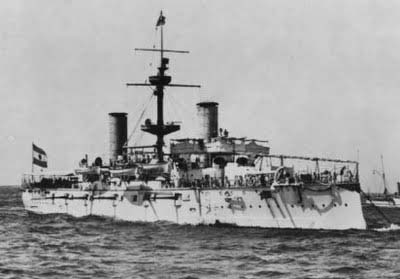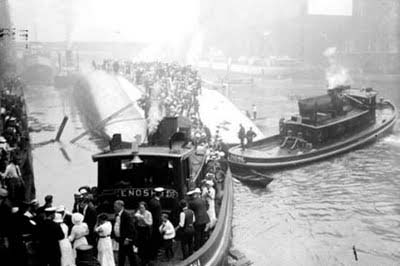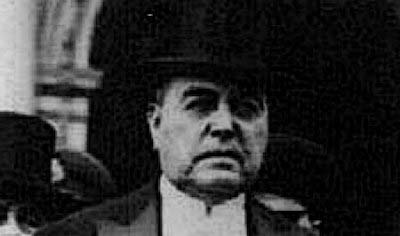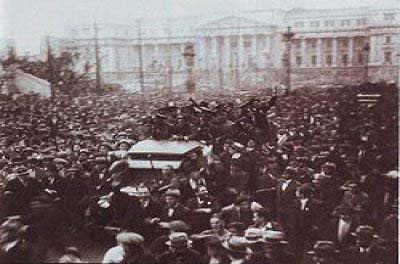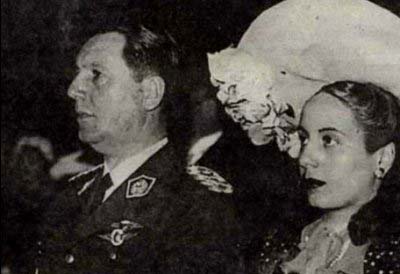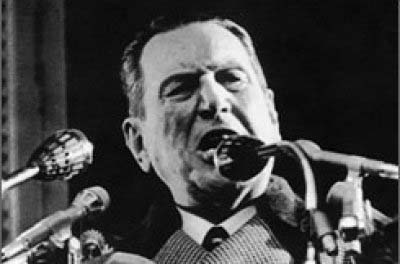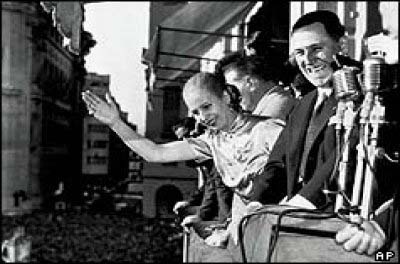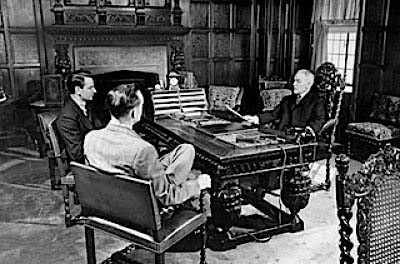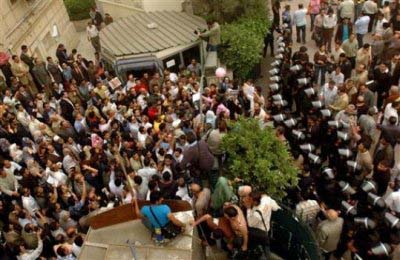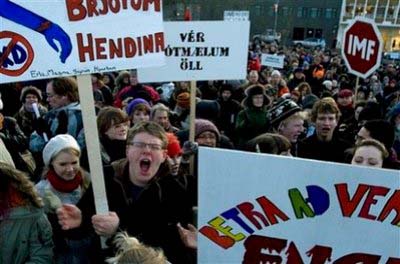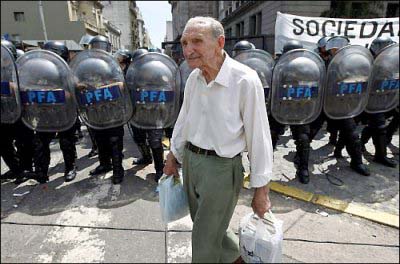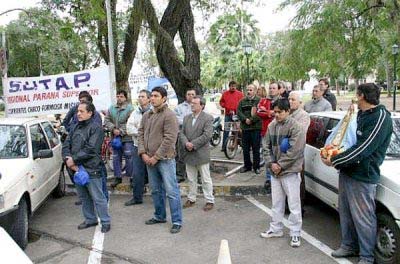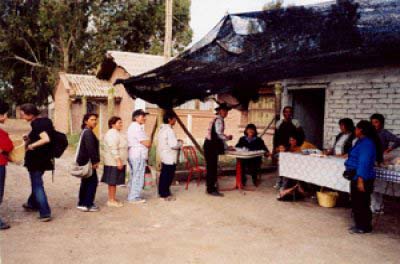|
Sleepy Lagoon
Murder, Roundup 1942
Charles E. Young Library UCLA
Notice at Least six Zoot Suiters in Gang Roundup
|
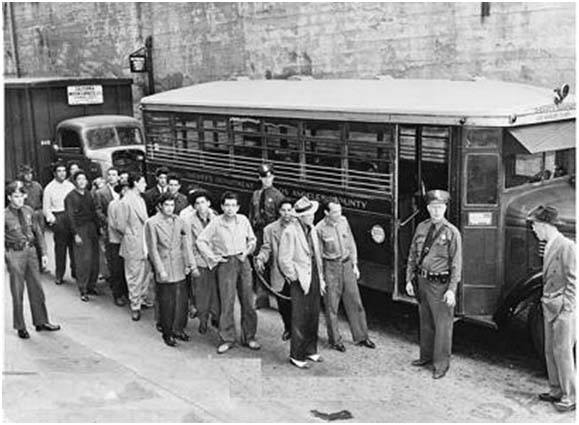
YA
ESTUVAS. Octavio
Paz writes, “The pachuco has lost all his inheritance: his
language, religion, customs, beliefs.
The only thing remaining is his body and soul unprotected
against the rough elements” (p. 17).
Mauricio Mazón, associate professor and chair of the
department of history at the University of Southern California, also
discusses the pachuco in his introduction of The
Zoot-Suit Riots: The Psychology of Symbolic Annihilation (1984).
Mazón confirms Paz’ observations.
EN
MI RANFLA, ése.
Early
sociologists of the 1940s and ‘50s approached the study of pachuco
culture believing it to be deviant and in need of fixing.
They looked for causes of pachuquismo
by pointing to things as poor housing conditions, problems at home and
in school particularly the language problem (Cummings, 2003).
Many of us in the barrio learned to speak the argot of pachucos/as
and dressed like them but we did not become pachucos/as. On
the contrary, we respected our parents and elders, sought to improve
ourselves economically and socially through education, and became
productive members of our society.
A research question for anthropologists then, might be, “What
factors explain why some Mexican American youths became members of the
group while others do not?”
|
L.A. Police
Round Up Mexican American girls, 1942.
L.A. Daily News, Charles E. Young Research Library, UCLA
Pachucas also known as Cholas or Cholitas |
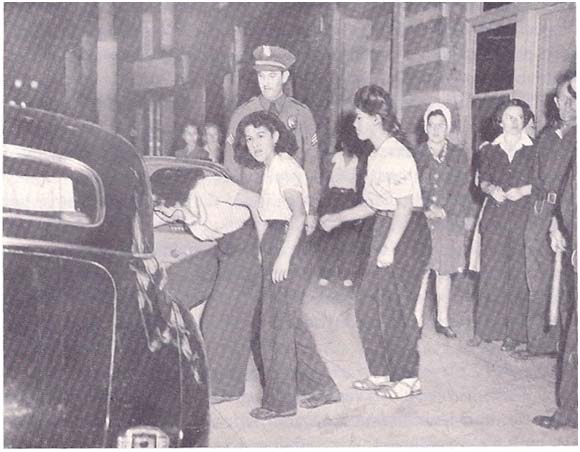
TENGO
QUE REFINAR, ése, SABE.
Scholars
of the pachuco phenomenon need to take a closer look at the normal
rite of passage of Mexican American youths in search of self identity
and need for association. It
is in close associations that we search for knowledge and the meaning
of life. Who hasn’t
grappled with identity issues like family, religion, class, ethnicity,
sexuality, and culture?
VAMOS
A MI CHANTE.
The public school system, a most powerful institution, did
little or nothing to teach Mexican Americans about their culture,
history and language in their formative years. The
bearded, dirty looking bandido caricatures in western movies insulted
the cultural heritage of Mexican Americans. They
learned that school and Anglo society expected them to occupy the
lower rungs of the social strata.
As members of the pachuco culture they could find acceptance,
lick their wounds and struggle to find their destiny in life.
In his anthropological study of pachucos in Tucson in the
1940s, Barker believed that vocational education was a key to a better
life for them (1979, p 33).
|
Zoot Suit
Riots May 10-June 7, 1943
Charles E. Young Research Library, UCLA
Mexican American Youths Stripped of Zoot Suits
Police on Scene After Clash with Servicemen
|
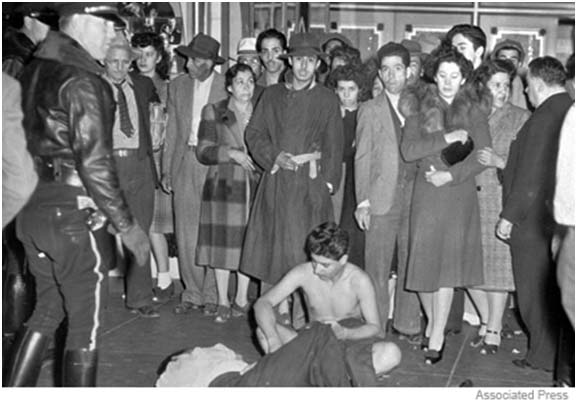
éSELE,
ERES DE LOS O DE JUARILEZ?.
The L.A. Times
sensationalized the so-called Zoot Suit Riots between the pachucos
from East L.A and sailors from Long Beach, San Pedro and Long Beach
(Alvarez, 2008, pp 168-91; Escobar, 1999, pp 115-202; McWilliams,
1990, pp 222-24; Acuña, 1988, pp 254-59).
But the newspapers did more than sensationalize because in so
doing they encouraged and spurred on the wanton disorder caused by
Navy and other military personnel.
The clashes were violent free-for-all brawls.
Qué
dice la ruca?
Ruth
Tuck (1943) reported the following about the pachuco dress.
She writes,
“Peg
bottoms and long coats, common enough in other large cities, had
been worn for quite some time in Los Angeles, not only by Mexicans
but by whites, Negroes, Filipinos, and other youth of certain
economic and social status. The
wearing of exaggerated clothing as a means of achieving distinction
and recognition denied in other fields is a well recognized
phenomenon” (1943, p 315).
Tuck,
a university professor in Los Angeles and scholar of Mexicans in
Southern California, reflected on the riots.
She believed that a change in the public’s attitudes toward
the “Mexican question” would come “with extreme slowness and
pain” (p 336). She adds
with clear foresight, “When the phrase ‘dirty Mexican’ is no
longer heard on the lips of any of those intimately associated with
Mexican youth—teachers, social workers, police officers—a good
beginning will have been made” ( p 336).
Pásame
un frajo.
Repression
of Mexicans by the Los Angeles Police Department continued into the
1990s following the Chicano Movement, 1968-1971 (Escobar, 1993, p
1512). In 1978 141
plaintiffs appeared in court to plead their case in a lawsuit against
the LAPD filed by the Coalition Against Police Abuse and the ACLU
(Escobar, p 1512; Acuña, 1988, pp 400-401). The
court forbade the LAPD from investigating persons and groups unless
they had reasonable cause. In
1987 González interviewed Fred Aguirre, a long time resident of
Placentia in Orange County. Fred
related that after he organized a chapter of LULAC in the 1940s,
“police entered into his family home, dragged his brother out, and
charged him with drunkenness” (González, 1994, p 181).
According to Aguirre, police saw themselves as above the law
and acted with impunity (p 181).
|

|
By
the late 1960s persons of Mexican descent became more conscious of the
disdain of the greater society. All
were fair game. It
didn’t matter if they passed for white or considered themselves
middle class, or activist Chicanos. By
1970 Chicano leaders saw the need to form an organization to protect
their civil rights creating MALDEF, the Mexican American Legal Defense
and Education Fund (Escobar, p 1513).
|
VAMOS
A JALAR, ése.
Although
initially the fighting took place in Los Angeles streets, they spilled
over into Watts, Santa
Ana and San Diego (Licón, 2009, p 40). Sal
Vela (2010) recalls witnessing in 1943 fights between sailors and
pachucos that took place on weekends on Fourth Street, Santa Ana.
They happened as soon as stores closed for the night.
Sal was 11 ½ yrs old at the time.
On June 9, 1943 the L.A. City Council drew up a resolution
stating that the wearing of a zoot suit constituted a public nuisance.
The intent of the City Fathers was to prohibit the wearing of
zoot suits in the city.
(To
view a video program of PBS’s the “American Experience: 1940’s
Los Angeles Riots,” see www.pbs.org/wgbh/amex/zoot/eng_sfeature/sf).

LA
GUACHé. Because
of the publicity accorded the so-called Zoot Suit Riots of 1943,
popular knowledge has it that pachucos originated in Los Angeles. So
did the pachuco culture originate in Los Angeles?
Apparently not. Licón
traces its origin to El Paso, la Ciudad Juárez, Tucson, and Mexico
City (p 50). He credits
George Carpenter Barker’s studies of pachuco culture in Tucson that
were published in 1950. Licón
cites Barker, “their language entered the U.S. through El Paso,
which came from Mexico, which in turn originated in caló
that can be traced back to the gypsies in Spain” (p 50).
See also Blanco, La
lengua española en la historia de California (1971, pp 524, 535),
and álvarez, and
The Power of the Zoot
(2008).
June
1942 Woody Herman Orchestra at the Uline Arena (Wikipedia)
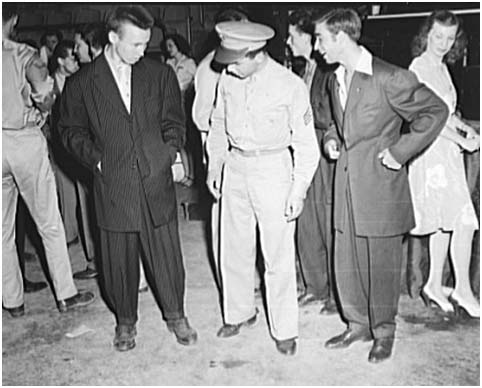
In
searching the Internet I came across the above 1942 photo in Wikipedia.
As a high schooler, Isabel Esposito Vela (2010) recalls seeing Anglo
youths sporting zoot suits in the streets of Brooklyn, NY in the
1940s. It shows two
youths wearing zoot suits in the foreground.
A third zoot-suiter stands behind the Marine.
The girl behind the zoot-suiter on the right casts a studious
glance at his pant legs. A
high school classmate tells of her aunt’s reaction to her son who
wore a zuit suit. To quote:
I
remember in the late 40s my cousin Cesar dressed in a very elegant
suit with a chain and hat. His pants were wide tapered at his
ankles. He was extremely handsome with green eyes. My auntie was
horrified and didn’t like her only child dressing like a LOCO.
|
Pachuco
from Westminster Barrio, ca.1944
Maurilio Castillo, 17 years old, born 1922
Photo Courtesy of son, Robert Castillo |
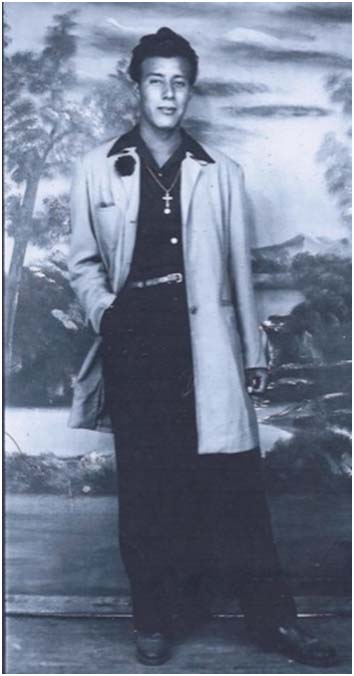
NO
LE HAGAS PEDO. For
a look-see of fascinating pachuco zoot suits, language as spoken en
el barrio, and música
try this most creative Website, www.elpachuco.com.
You will find it quite entertaining.
And if you Google “photos of pachucos,” you won’t be
disappointed.
SOFTBALL
IS KING AT SIGLER PARK.
The park was our favorite place to meet friends, borrow the park’s
roller skates, play tackle football (no protective gear), and use the
diamond to play softball. This is where Anglos and Mexican
Americans mixed socially. But Sundays were particularly special
for us. Local and visiting fans filled the stands thrilled to
watch their favorite team win.
|
LOS TORREROS
TEAM PLAYERS
Left to Right: Diego Gonzalez, George Cepeda, Jimmy Romero,
Tony Rivera
Sitting: Roy Vega |
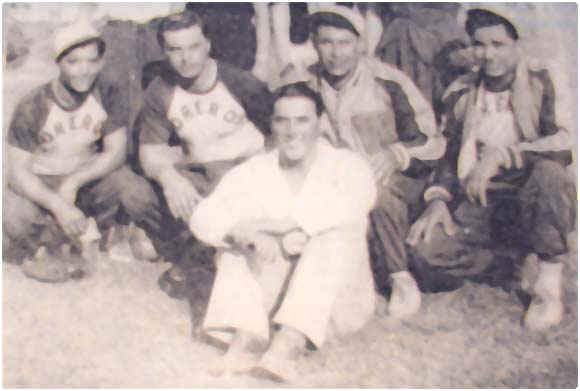
LOS
TOREROS. Our
Toreros or LULACs usually played a visiting team from another barrio.
A sound system with speakers and a microphone were set up for all to
listen to the announcer and the loud Mexican music that added to the
charm of the day. Invariably a man from la Garra would
grab everyone’s attention by raising a $20 dollar bill (half a
week’s wages in the ‘40s and ‘50s), and challenged everyone to
bet against his team. Things jumped with excitement Sundays at
Sigler Parks.
FISHING
CRAWDADS.
The custom of fishing crawdads was passed on to young ‘uns by older
brothers and barrio friends. This was one of our favorite things
to do especially on summer days. Like Tom Sawyer and Huck Finn
on the Mississippi, we’d wander off south of the Hazard dirt road to
a ditch lined by trees on both sides. The four-foot ditch went
south paralleling Hoover St and the Southern Pacific RR (Espee).
About an eighth of a mile from Hazard, the ditch and a spur of the
railroad tracks made a right angle west toward the U.S. Naval
Ammunition Depot in Seal Beach.
It
was easily within walking distance south of la Garra.
We’d take twine for the line, matches, and a pocketknife to cut down
a long tree branches that we used as fishing rods. We’d look
for the granddaddies, the ones with the big red claws. They had
more meat in their tails. Most hung onto the bait as we pulled
them out of the water. The more experienced cangrejos
would let go of the bait about half way out of the water.
When we fished enough of them, we’d put their tails and claws into a
tin can, add water, and cook them over a fire until they turned
brilliant red. Scrumptious!
JAPANESE
GOLDFISH FARM.
We also learned about goldfish that managed to slip away from the
world’s biggest goldfish farm. It was on Bolsa Road just west
of Goldenwest Avenue, and was owned by a Japanese family. We’d
have to walk farther to get our beautiful angel tailed gold fish, all
the way to both corners of Goldenwest and Bolsa Streets. We
didn’t use fishing nets but an empty tin can and/or our hands.
Mom and dad would have died had they seen what happened to me a time I
went fishing in the ditch. We’d take our shoes off to enter
the water. One time I heard the jagged piece of broken glass
tear into the sole of my right foot! The sound went right
through my body. Joe S Akiya, Japanese-American, ran the Farm
started by his dad “who came to Westminster from Japan.” In 1961
Joe had been living in Westminster 35 years (http://digitallibrary.usc.edu:80/search,
December 12, 2009).
VENDORS
EN EL BARRIO. Barrio
residents looked forward to the regular visits of a number of vendors.
One of our favorites was the Good Humor man who announced his coming
with recorded music. My favorite was the chocolate covered
frozen banana ice cream.
SHORTY,
THE ICE-MAN. Shorty,
the ice-man, made regular stops at our place to deliver a big block of
ice. I liked the way he used the heaven metal thongs to pick up
a block, swing it around his shoulder, and place it in our icebox. In
the summer Shorty was pretty good about giving us boys chunks of ice
that cooled us down. I always felt like Shorty was simpático
because of his friendly, cheerful disposition with us. Then
there was our Spanish speaking verdulero who rode his old Ford
truck loaded with fruits and vegetables. Sometimes he’d give
us kids overripe bananas. But that was okay with us.
YUMMY
CREAM PUFFS. One
thing seems to be for sure. It is that if we looked forward to the
coming of the Good Humor man, we were especially delighted to hear the
shrill whistle of the Helm’s bakery man. One way or another
we’d put enough coins together to buy those delightful cream puffs.
A vendor that I paid no attention to was the one who sold women’s
clothes. I understand he married one of the girls from la
Garra. Although the junk man was not a vendor, I mention him
here because during the war he came from outside the barrio to do
business with us. He was a buyer of rags, abandoned cars, and
metals. Word had it he was Jewish. He was a frequent
visitor of the barrio.
CUATES
/ CUÑADOS / CARNALES.
A cuate (twin) was someone whom you always palled with.
You and your cuate were inseparable. I had several:
Chente (Vicente Herrera), Tony (my brother), and Arthur Moreno.
You would call someone a cuñado who had a pretty sister, the
idea being that one would marry that sister. It didn’t matter
that the sister was much older. Calling our friend a cuñado indicated
a form of bonding, a sign of true friendship.
FR
JOHN MCFADDEN, OUR FIRST COLUMBAN PASTOR.
One Saturday in 1944 when our pastor was building the parish’s first
social center, I heard banging coming from that the direction of the
church. Curiosity got the better of me as I ventured out to
learn the source of the noise. As I came out of the Medina
alley, I saw the framed-out walls of a building under construction.
Standing up high on a stud was a middle-aged man with white hair and
fair complexion, an Anglo. He was holding on to 2 x 4 studs. On
seeing me the stranger started talking but I understood not a word.
EL
MARTILLO, POR FAVOR. Next,
he raised his voice pointing to the cement floor. Aha! He
wanted me to fetch the hammer he dropped! It was our pastor
wearing white carpenter overalls. Since he was bilingual in
English and Spanish, why didn’t the stranger say, Oye, niño, se
me cayó el martillo. Dámelo, por favor / Listen, little boy, I
dropped the hammer. Kindly give it to me. The building
became our first parish center that included a kitchen.
Civilization had moved into our barrio!
PADRE
JUAN AND HIS BICICLETA. Everyone
in the barrio loved this priest, our first pastor, 1942-1949.
He’s remembered as riding his bicycle to visit local parishioners,
and those who lived at a distance like Ocean View, la Colonia
Manzanillo (Euclid/Seventeenth Streets, Garden Grove), la
Colonia in Stanton, la Colonia Independencia off Katella in
west Anaheim, Garden Grove, Wintersburg down Huntington Beach way,
Barber City, and other localities. One Saturday I saw him ride
his bicicleta to bring us a bag of oranges. It didn’t
matter that we already had oranges. What meant a lot to us was
his kindness, his thoughtfulness.
Arsenault and Veneroso (1996) report that Padre Juan was doing
missionary work among the Mexicans in 1939 (p 11).
He and Fr Robert Ross worked out of the mission church, St
Isidore, in Los Alamitos. Columban
missionary efforts in Orange County began in 1937.
Early
1950s Photo of Padre Juan McFadden and his Bike
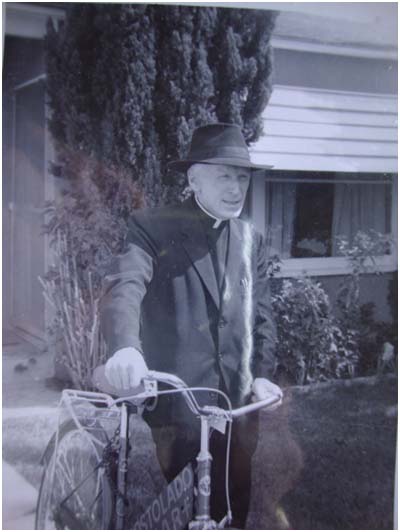
OUR
FIRST CHURCH.
Before the Los Angeles Archdiocese acquired the Japanese community
building in 1942, barrio Catholics were considered a mission church
community until 1947. Previously Catholics from the barrio
attended Mass at St Isidore Church in Los Alamitos.
They went there to get married, be baptized and attend jamaicas.
Joe Arganda (2010) would drive his dad’s 1929 Chevy to Los
Alamitos and bring a Spanish--speaking priest to the barrio.
Although Julia López, (2005), Catalina Vásquez (2006), Sal
Vela (2006), and Andy Vásquez (2006) say that someone would pick up
the priest, now we know the identity of one of the drivers.
Early barrio residents (1930s) heard Mass held at the home of José
and Florentina Pérez on 14382 Olive Street en la Garra.
Parishioners also assisted at Mass in the drafty garage of don
Bonifacio Cervantes on south Main Street.
|
First
Catholic Church in Westminster Barrio 1942-1951
Purchased by Archdiocese from Japanese American Community
Photo Courtesy of Blessed Sacrament Church |
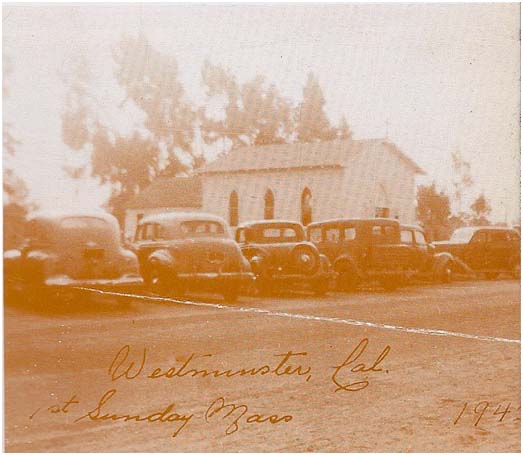
These
early Blessed Sacrament mission parishioners also used the Boys Scout
cabin in Sigler Park for Mass. The Pérez family was one of the
first Mexican settlers of the barrio. It’s significant to note
that Mr and Mrs Ray Burns and family attended Mass with the Mexican
community in don Bonifacio’s garage (Julia Vela, 2005).
The News, Garden Grove’s
newspaper, reported the death of Ray Burns in 1961.
He had been a resident of Westminster since 1930, and lived in
Orange County for 38 years (in Arsenault & Veneroso, p 40).
Ray
/ Helen Burns ca. 1950
Courtesy Blessed Sacrament Church
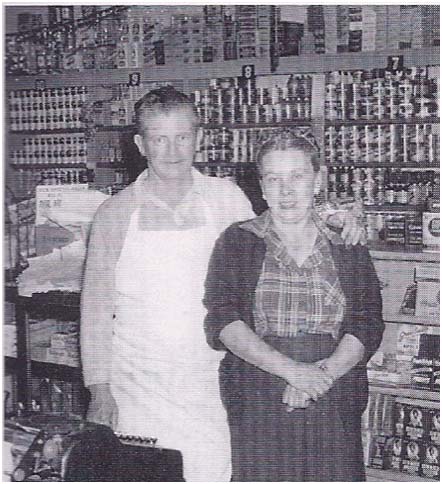
HELEN
& RAY BURNS. The
Burns lived on the S/E corner of Olive and Spruce Streets. The
family consisted of Dave, Patty and Bobby who was born in 1946.
Bobby and our brother Michael became best pals although they each
spoke a different language. They owned the grocery store on
Westminster just two blocks up the road on Olive. The store was
previously known as Day’s Market. Mr Day, of English origin,
was Helen Burns’ dad. He lived with the Burns until his death
in the 1950s. Today’s extension of Olive Street runs across
Westminster Blvd over where the Burns Market and parking lot used to
be. Ray and Helen Burns
donated the property on which the parish school is located in exchange
for a new home by the church. Their
home used to be where the parish hall/gym was built on the N/E corner
of Olive and Spruce.
|
Early Altar
Boys. Boy on left is Herman Alarcon in front of Mission Church
On right is side of new Rectory 1946
Behind Rectory is Parish hall 1944
Photo Courtesy of Blessed Sacrament Church |
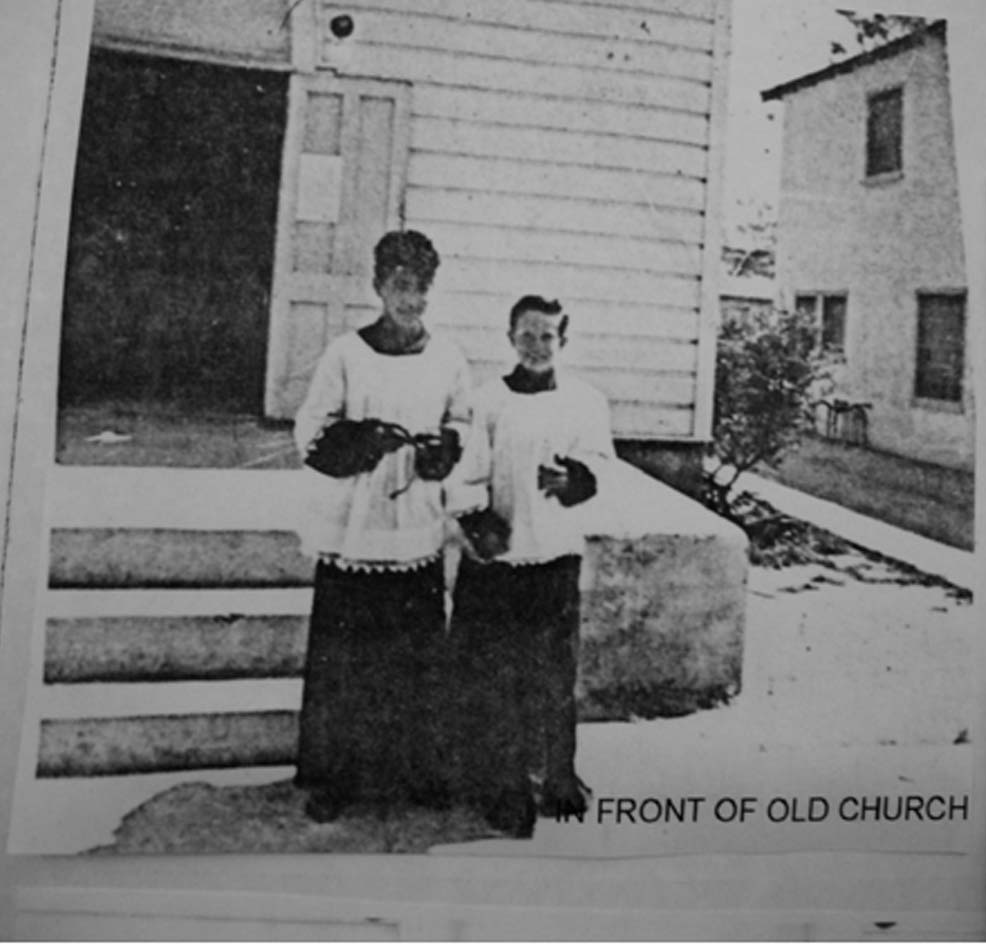
ALTAR
BOYS DEL BARRIO.
Early on the Columbans (Fathers Joe Murrin, Kevin McNally, Ernest
Speckhart, Thomas McCormack) taught the 7th
and 8th
grade barrio boys to serve Mass. Among those in this group were
Frank Mendoza, Pili Ledesma, Rudy Ybarra and Paul Medina. By
1948 they also taught us younger boys including Herman Alarcón, Rudy
Arganda, Arthur Moreno, and Al Vela. In this younger group, all
except Rudy Arganda lived en la Liga. By 1950 our small
group of regular altar boys were integrated by Anglo friends.
Some were Jimmy Brown and Jackie Clausen. We did the 6:30
weekday Masses, Sunday Mass, and assisted at Benediction evening
services as well as at funerals and marriages. As for the
special Mexican marriages, these were usually celebrated during the
10:00 Mass on Sunday.
We
wore a black cassock and a white surplus that was washed and ironed at
home. We entered the sanctuary before Mass to light the candles
on both sides of the altar. When the father gave us the signal
we preceded him. We said prayers in Latin at the foot of the
altar, rang the chimes at the proper times, and were at each side of
the priest during Communion to catch the wafer with a golden paten
should the wafer drop. Certainly one of our favorite altar
boy chores was pulling on the rope to ring the bell that announced the
start of Mass. As for the Latin responses we said during Mass, we
often read from a plastic card. It
also helped us anticipate what we had to do next. My older sisters
expressed pride in me that I was an altar boy.
WHEN
TIME STOOD STILL IN THE SANCTUARY.
One Sunday morning an altar boy came into the sanctuary to light the
candles by the altar. Very routine business but then the side of
his white surplus caught on fire! For the longest time no one
seemed to know what to do. Finally one of the men left his pew
to put out the fire! Looking back, the sanctuary is as the name
describes, a holy place. A railing between it and the pews
symbolized the sacredness of the space on the other side of the
railing. The other side of the altar was for to the priest
alone.
Ray Burns
Store ca. 1948
Olive Street Ended at This Point of Westminster Blvd.
Store Was Removed to Extend Olive Northward
Shoe Repair Shop on Right Later a Real Estate Office
Further East is Menard Market
|
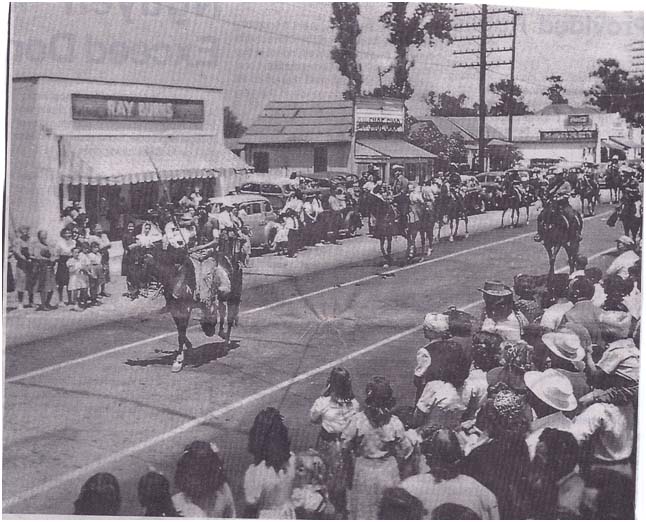
DON
PANTALEÓN.
With only eight pews on either side of the center aisle, the church
could only hold about 100 persons (Arsenault & Veneroso, 1997, p
18). There was no designated seating and persons of either
gender could sit where they pleased. Instead of sitting in the
pews during Mass, don Pantaleón Bermúdez knelt fervently inside the
sanctuary on the right of the altar. At the consecration of the
Mass when the priest raised the bread and wine, don Pantaleón
reverently raised his outstretched hands.
Then
with the coming of the Irish Columban sisters, this practice ceased.
Don Pantaleón was well regarded as a kind and generous man donating
property to Blessed Sacrament. Some
of his descendants continue to live in the barrio.
A story told by Catalina Vásquez (2010) about don Pantaleón
is about his love of music. It
seems that my padrino Julio López hired musicians from a Los Alamitos
jamaica to play at his home on Maple Street (then an alley).
When don Pantaleón heard the music he decided to investigate.
He liked them so much he hired them to play at his house.
People came to worship at the mission church from various
localities like Garden Grove, Los Alamitos, Wintersburg, Independencia,
Stanton, New Westminster, and Barber City.
|
Early
First Holy Communion Class ca. 1938
Sal Vela Hand in Pocket Standing next to Fr Robert Ross on right
Fr John McFadden, Pastor, Looking Right in Middle Background
White Hair
Anglo First Communicants Are in Picture
Photo Courtesy Blessed Sacrament |
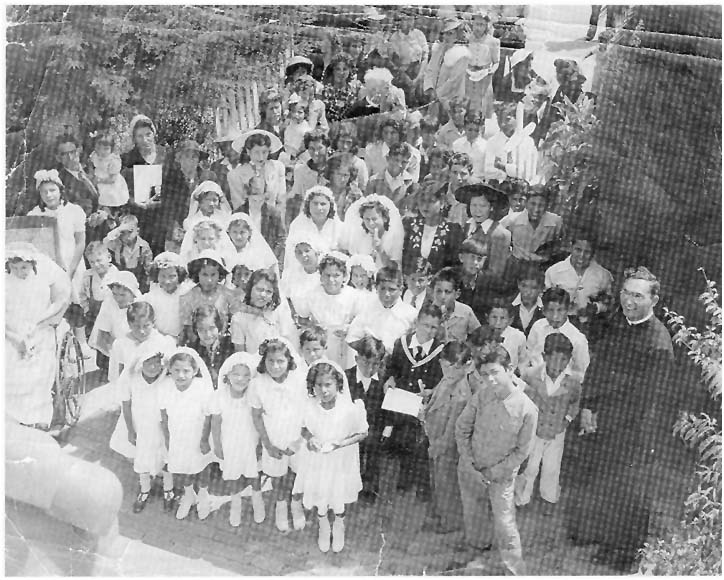
FIRE
AND DAMNATION.
When Father Juanito (John) said Mass, he would preach in fluent Spanish
that to my ear had a strong English accent. Why he spoke so loud I
was too young to understand. Years later I learned that in the
early 1900s sermons in the various denominations dealt with matters of
“fire and damnation.”
Padre
Juan was also our catechism teacher. Once he told us that an angel
was a pure spirit, that you couldn’t see him. The idea that
angels were pure spirits puzzled me. But I understood my mother
when she said, Qué los ángeles te lo paguen, hijo. (May the angels
reward you, son.)
JOBS
FOR A BARRIO BOY.
Having an allowance was unknown in the Vela household. It was out
of the question. One of the easiest ways to earn money was finding
glass soda and beer bottles to redeem them at the store. Big bottles,
jumbos, were worth a nickel while the smaller bottles were redeemed at
two cents each. It was easy to find bottles for cash south on
Hoover past the Hazard alley where people would dump their trash.
ONE
SUMMER WITH MOM. One
summer in the early 1950s I accompanied mom to a job picking tomatoes at
a ranch a mile north near Hoover Street. The part I remember is
when it was time to climb into the truck that was hauling a caterpillar
on a big trailer. I was lackadaisical about getting to the truck,
too lackadaisical because the driver started off without me!
PICKING
BOYSENBERRIES.
One Saturday morning some of my older siblings were secretive
about their plans. I saw them leave the yard going toward the
park. They didn’t spot me until it was too late. When we
got to the place to pick boysenberries beyond the park, they told me
about the thorns and showed me how to pick them. I’m sure I ate
as many as I picked. They were big and mouthwateringly delicious.
Orange
Groves in Orange County 1940s
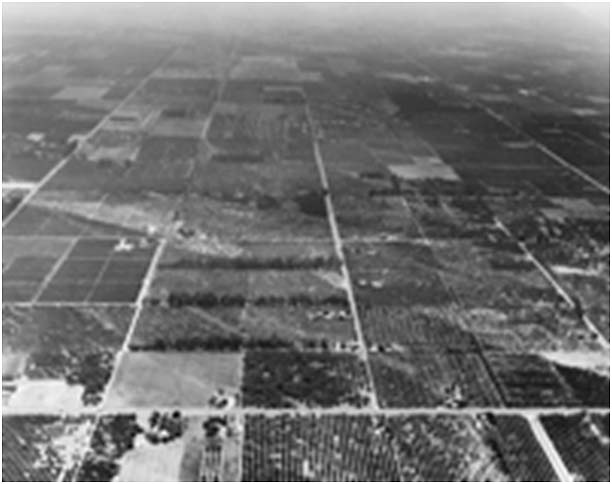
A
LA PISCA DE NARANJAS / PICKING ORANGES. In
addition to picking strawberries with dad, and carrots, tomatoes and
string beans, the most fun without a doubt was picking sweet Valencia
oranges. It was hard waking up at 5:30 am. That’s when dad
would come into our room and say, “Levántense / Get up.” The
radio in the kitchen was always tuned to a Los Angeles Mexican station
that played ranchera and corrido music making you feel
great to be alive. This was country music at its best.
Breakfast
might include fried eggs, made refried beans, chorizo (hot
Mexican sausage), fresh flour tortillas, or Mexican style fried
potatoes. At this time our family used to drink hot chocolate or
Postum, a caffeine-free coffee. I never knew other coffee brands
until high school. We’d then make a sack lunch that always
included a couple of tacos and milk poured into a Mson jar.
A
canvas-covered truck would come into the barrio to pick us up and other
barrio vatos. Another group of guys in the barrio of Artesia in
Santa Ana would fill the back of the truck. Then we were off to
various orange groves in Orange, the Santa Ana Canyon, Colton,
Arlington, and Riverside.
The
best part was the joy of camaraderie as the guys teased back and forth,
sing rancheras to their hearts content, and the tell lies about
each other. Before long it was time for lunch. By then
someone had started a small fire on the shady side of a tree.
We’d find a spot to warm our delicious tacos on the hot coals.
Then it was time for more stories and bantering back and forth by the vatos
(guys, also spelled “batos”). It was a hard physically
tiring, dirty job. I heard from dad about a robust young man who
injured his back unloading trucks at a packinghouse. By and by I
don’t recall anyone complain about insects.
RATAS
EN LAS HUERTAS / RATS IN THE GROVES. At
12 years old I wasn’t strong or agile enough to handle the 10-12 ft
ladder. Hence dad or one of my brothers would relocate it when I
was done picking a section of a tree. It wasn’t bad picking.
One had to be careful to balance his sack especially when stretching to
grab an orange. I imagine that in the beginning I was what was
called a rata (rat). Rata conjures up in
one’s mind a creature low to the ground. That was we shorter in
stature but not in might, who concentrated in picking oranges within our
reach from ground level.
Most
guys were adept in using two hands to cut oranges. Others used a
swift motion in cutting the orange at the bud with tijeras
/ clippers in one hand while twisting another with the other hand.
This was a special tool that was fit comfortably in your hand.
Your index finger slid through a leather loop.
This made it possible to hold on o the clippers at all times.
Without the handy loop, one would easily lose control of the clippers
requiring one to go down the ladder and retrieve it resulting in loss of
time and lost wages. The
cutting blades were always in an open position held that way by a
spring.
|
Mexican Crew of Orange Pickers, ca. 1930
Hewes Orchards, Orange, CA
Photo Courtesy of Orange County Archives |
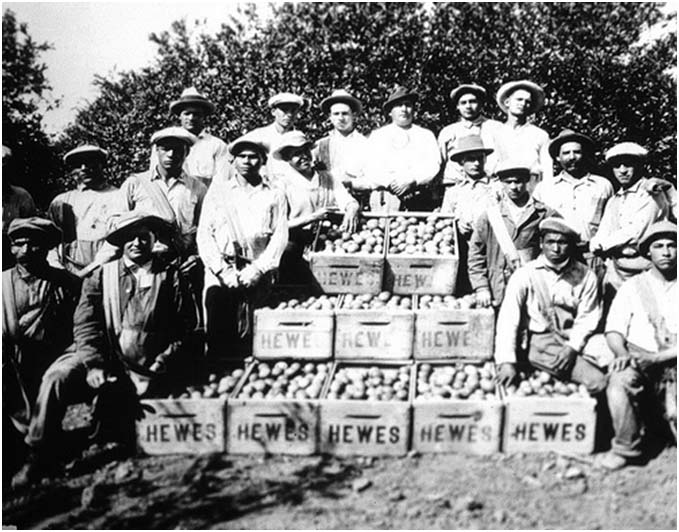
Pickers
carried a saco / sack with a
round opening at the top. When
the saco was filled it had
the shape of a tube. A
harness went over one’s shoulder and neck. It was relatively easy to
use both hands to cut the citrus at the stem (Street, 2004, pp 507-508).
Emptying the sack was a simple matter.
One released one or two hooks at the bottom of the tube and
carefully controlling the flow of the fruit as it emptied into the
crate. One did not want to
bruise or damage the fruit in any way.
When filled to the top, the sack weighed 50 pounds.
By 3:00 pm I was ready to hear the cries of the vatos, “Vámonos!”
/ “Let’s go!” for the long ride home, clean up, and a hardy dinner
and a game of softball under the lights.
Friday, payday, was definitely the best part of the week.
Looking
at Mount Baldy from the Orange Groves 1920s
Valencias Preferred WSarmer Areas Nearer Coast
Navels Grew Best in Foothills |
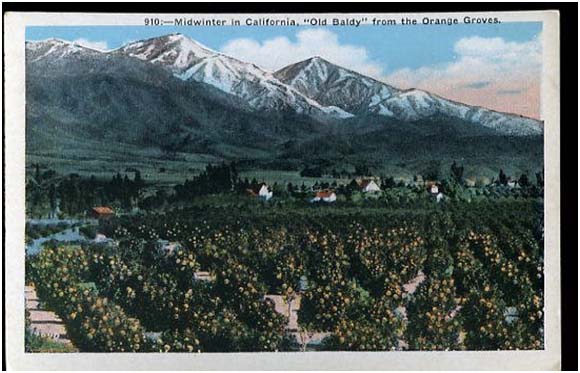
In
the summer of 1954 everyone in my cuadrilla
/ crew got paid piece-rate by the number of crates filled. It was
a big wooden box divided in the middle. A crew would come around in a
truck to load the crates. They recorded your name and the number
of boxes picked. I tended to daydream while up on the ladder, so
my production was low. I was happy to make $20-$25.00 a 40-week.
At this rate I averaged $4.00-5.00 per day. It was not unusual for the
older more experienced vatos (guys) to earn up to $40 to $45.00
weekly. We wore long sleeved shirts to protect our arms, Levis, a
hat, a bandana around our necks, and work boots.
Unfortunately for us, the grove owners did not provide us with
toilet facilities nor drinking water.
When
I was in high school I lost a ring en la pisca that my
girlfriend, Marilyn, had given me. She was visibly upset when she saw I
wasn’t wearing it. Heck I hadn’t even noticed! How could
admit I’d lost it? I felt really small and embarrassed about it!
|
Santa Ana
Canyon View Looking South from Yorba Linda, CA 1965
Imperial Highway on Right Santa Ana River in the
Background
A Number of Orange Groves Visible Santa Ana Canyon Rd in the
Back
Photo Courtesy of Orange County Archives |
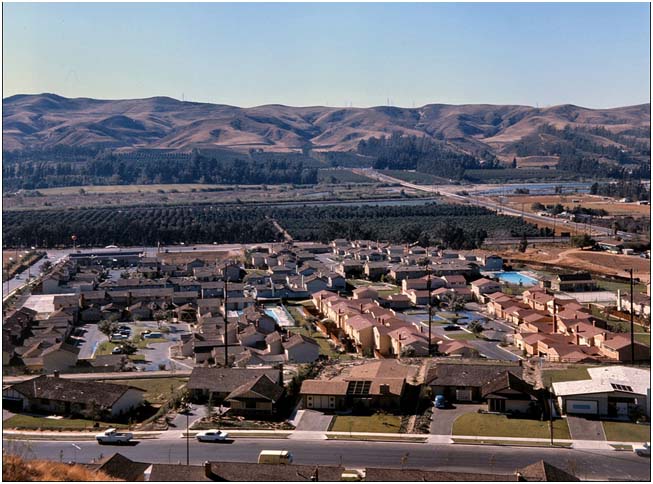
A
GROVE IN THE SANTA ANA CANYON. I
recall an incident while picking oranges in the Santa Ana Canyon.
The grove was on the north side of the Santa Ana Canyon Road and both
sides of Imperial Highway. Inside the orchard I noticed an
artesian well that was uncovered. It was made out of concrete and
below ground level was a with a heavy metal wheel that one could turn.
Curious about it I turned it to the right, then to the left and soon
forgot its original position. Later I saw that the truck with its
heavy load got stuck when it got to the place where the water from the
well had been released! Someone had left the key open!
THE
CALIFORNIA HIGHWAY PATROL. Something
scary happened to us while driving through the Santa Ana Canyon.
We were a caravan of a couple of cars and two trucks each towing a
trailer laden with ladders. For some reason CHP cops on motorcycles
stopped us. They asked questions in English of us who were in the
truck. Satisfied with their careful inspection they let us
proceed. This was in 1954 during Operation Wetback. They
were looking for Mexicans who had crossed the border illegally. To
be sure this was a scary moment. Looking
back I know I felt like an outsider.
My
saddest moment was when the owner of a grove in Orange came to our truck
at the end of the day. He asked us to get out of the truck and
empty our sacks into the crates. Then he lectured us about how much
money he would have lost. Most orchard owners considered the
practice of taking oranges home as a benefit to the crew of pickers.
MR
RICE AND PACKARD BELL. Mr
Rice was a big man rather overweight which I think caused him to
perspire a lot. Bobby Moreno assisted him when he went to
people’s homes to repair their black and white TVs. I envied
Bobby when I’d see him in the passenger seat of Mr. Rice’s panel
truck.
There
came a time when Bobby said I could have his job if I wanted it because
he was planning to quit. I paid Mr Rice a visit at his TV Sales
& Repairs store next to the San Pedro Lumber Company. It was
across the street from the Seventeenth Street School on Westminster Blvd
and a five-minute walk from my house. I didn’t last long working
for Mr Rice because I found this job incredibly boring. I felt
unchallenged by the routine of fetching a QU5 TV tube and handing it to
him, carrying the equipment into the home, putting the equipment back in
the truck, handing him a tool, etc.
WORKING
FOR MR BROYLES. Mr
Bill Broyles owned a big nursery store on the east side of Beach Blvd
and north of Westminster Blvd. He had two sons and loved to go
fishing in Oregon. Felix and I helped him install lawns and
underground sprinkling systems in town and in new housing developments
in Garden Grove. One time he told me he was going fishing with his
family and they’d be away for a week’s vacation. He explained
I would be watering his stock and showed me the paths he took to water
the different sections of the nursery.
Upon
his return he told me he was surprised that not one of his plants had
died from lack of water. He explained that when they watered it
was not unusual see dead plants because he missed watering them.
Mr Broyles liked the way I worked and said he would pay my tuition at
USC to be a landscaping architect.
The condition was that I work for him.
I didn’t fully appreciate the significance of his offer and
didn’t tell i my parents. Perhaps if I’d had some knowledge of
botany I would have felt more confident about discussing my boss’s
offer with my dad. In time I moved on to another job and
interested my younger brother Tony in taking over this nursery job.
NIGHT
DUTY IN 1955. It
was the summer of my senior year in high school and I was looking for a
job. My pastor, Fr Robert Ross, had lots of business connections
in Orange County so I talked to him. A day or two days later I got
a call from the owner of a furniture store in Garden Grove on the S/E
corner of Beach Blvd and Hwy 39 (Beach Blvd).
He
explained that he needed a security guard because his store had been
broken into. This was a busy intersection in 1955 especially on
weekends. Should the thieves return to rob his business, I was to
call the cops. He said nothing about finding a place to hide!
Lucky for me nothing out of the ordinary happened. By the
third night I found my routine. Find my spot, look out the front
window toward Garden Grove Blvd, make sure the doors are locked, find a
secure spot in the dark, and listen to the “Wolf Man” radio show.
The
Wolf Man was a black personality out of Los Angeles who played rhythm
and blues songs and spoke to his fans who called him over the phone.
I’ll remember for always the exchange the Wolf Man had with an
admiring Blackboy. The dialogue between them was touching because
of the warmth and tenderness of the Wolf Man (WM). The
conversation went like this:
|
WM:
Hello!
Boy: Hello, Wolf Man! I love you, Wolf Man.
WM: Who’s dat
calling?
Boy: [Boy gives his
name.]
WM: How old are
you?
Boy: I’m 12. How old are
you?
WM:
Nineteen!
Boy: Oh, Wolf Man!
|
SHOE
SHINE BOY. When
I was in seventh grade, I was anxious to earn $40.00 to pay for a
beautiful Schwinn bicycle. I saw it one day that I was in the
Columban sisters’ garage. I happened to look up and saw that
precious thing that seemed to have my name on it.
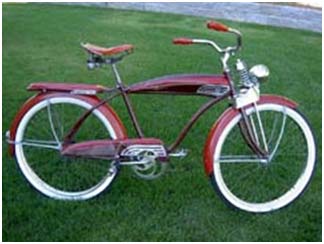
THE
SCHWINN BIKE. I
asked the Mother Superior about it. She said it belonged to Fr
Speckhart, that someone had given it to him. Father said he would
sell it to me. That gave me the ambition to find a way to make
$40.00 quick. Either dad or Sal helped me design a shoeshine box.
I made a lot of my money shining shoes Saturdays at a café on
Westminster Blvd known as el Patito (little Duck).
This was not actually name of the café. We called it that because
of the owner—he used a cane and walked like a duck. The money I
charged, ten cents a shine, was the going rate. I called it a day
after making a dollar.
The
day I exchanged the $40.00 for the Schwinn was momentous for me, a big
achievement. What made the bike so special was the spring in front
and the fact it looked new. In time I learned to adjust the
brakes, repair the chain, and patch the inner tube when I’d get a
flat.
Shining
shoes, picking tomatoes, and redeeming bottles at Ray Burn’s Market
were some of the ways I made money. On Saturdays I also cut the
lawn for the sisters’ Convent at $0.50. I was happy to give up
that job because of the blood calluses I got from pushing the reel mower
that seriously needed adjusting. I got a better offer from Mrs.
Burns who offered me a $1.00 to mow their smaller lawn. They had a
better mower a lot easier to push. Now this was progress: I
doubled my earnings by working less and no more bleeding calluses!
EASY
MONEY. Without
question one of my better jobs was babysitting for Bobby Burns.
Mrs Helen Burns would give me $5.00 to take Bobby and Michael, my
brother, to the movies in Santa Ana! Was this easy money or what?
OTHER
JOBS. After
graduating from Mater Dei High School (Santa Ana) in 1956, I went to
Knott’s Berry Farm to apply for a job. After giving the required
information on the form, I wrote that I had been accepted at Loyola
University in Los Angeles (Loyola Marymount University).
Original
Knott’s Berry Stand, Buena Park, CA circa 1926
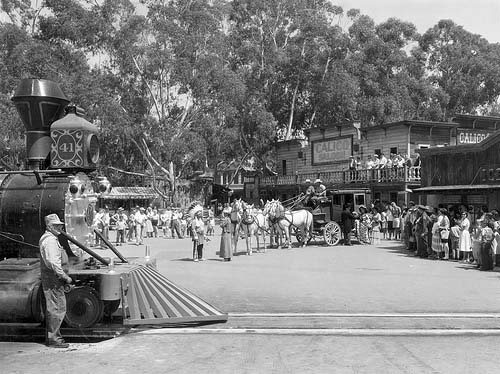
KNOTT’S
BERRY FARM. I
believe the person who read my application was impressed and that’s
why I got the job as a stock clerk in the Knott’s Berry Farm Preserves
Store. One time I helped two pretty girls take cases of preserves to
their car. They’d driven across country from New York. As
part of their vacation they said they’d gone to Santa Catalina Island.
I asked them how they liked it and they said they weren’t that
impressed. But they had also been to Las Vegas. At that time
in the 1950s you could win silver dollars in Vegas casinos. The
girls were generous in tipping me with silver dollars.
|
Calico Square, Knott's Berry 1952 |
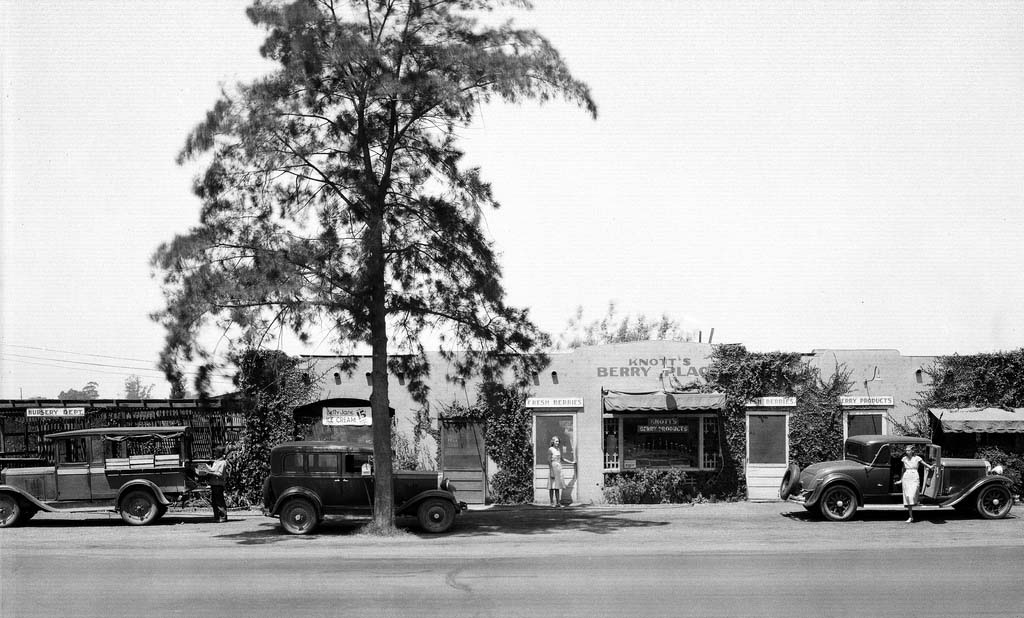
AN
ANGEL IN DISGUISE. In
time I lost this job because they needed a full time employee and I
needed a job. I remembered a promise Mr Gallagher made to me the
night of graduation in 1956. After congratulating me, he said,
“Al, if I can help you find a job, let me know.” Two weeks after
calling him, he told me to report to Bob’s Supermarket in Westminster
and introduce myself to the manager. It was the first supermarket
in a growing city. The pay was good with 40 hours of work as a box
boy.
Within
a year a bigger supermarket chain, Mayfair Markets, bought Bob’s.
This was great because I was able to transfer to a store in Inglewood
near Loyola University. I lived on campus only four miles from the
store. Some of coworkers were UCLA students. The store
manager, Charley, must have liked me because he gave me tips so I could
be a checker and make more money.
1950 Ford 2-door Coupe
Author’s First Car Bought in 1958 while at Loyola University
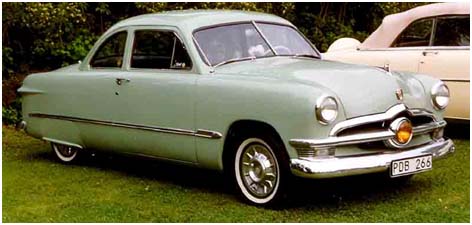
1950
FORD. I
needed the money to buy my books, go to the dances and movies, buy
clothes, and pay for gas for my 1950 Ford coupe. This store did a
very good business and was run by Charlie, the senior manager and his
two assistants. One of them was a Mexican American who said to me
that he was discouraged by the fact so few Mexican Americans aspired to
improve themselves. His observation was new to me. I
didn’t know how to answer him so I didn’t comment. What was
also a surprise to me was learning there could be such a thing as a
middle class Mexican American Jew!
FRUIT
TREES IN AND OUT OF THE BARRIO. Practically
all Mexican homes had a couple of fruit trees in their yard. We
had two varieties of peaches, a tall avocado, two fig trees, and a
pomegranate whose fruit was not at all sweet. Summer nights Arthur
Moreno and I would go out outside the barrio to raid people’s plum,
apricot and peach trees. I guess one night we made too much noise
moving the branches about in search of the fruit causing the owners to
chase us away. Funny that something as scary as this could be also
so exciting. Art and I were so scared we laughed as we ran away.
MR
PANTALEÓN BERMÚDEZ.
Don Pantaleón had a lot of property south of our home adjoining the
Burns’ property. His home bordered the railroad tracks on
the east side. A variety of tunas / cactus pears grew
alongside the tracks. Tunas are a little smaller than goose
eggs and here by the tracks they came in different colors: orange,
reddish-violet and light green, all delightful to our taste. It
was a challenge for us to cut them down because of the spines on the penca
/ the fleshy “leaf” of the cactus plant. We used a wad of
newspaper to hold the tuna and a knife to cut it down. But
why use newspaper? Simple, the outer skin of the tuna is
loaded fine prickers! And though hard to see on your skin, they
irritate you terribly especially if they get stuck on your lip or
between your fingers!
The
Bermúdez had a long driveway that started on Main Street.
Seemingly countless pomegranate trees lined both sides of the drive.
Even though I seldom went onto this side of Main, I had the impression
that lots of persons lived in the Bermúdez residence and their
relations across the street.
Albert
(Beto) and his wife Isabel live in East Hampton, CT.
Both are retired. Beto
retired from the Consolidated Schools of New Britain, CT after 20 years
of service. This was in
1998. Then he finished his
doctoral program at the University of Connecticut in Storrs in 2000.
He started his research for a book on the barrio of Westminster
in 2005 after attending the Annual Olive Street Reunion.
He is indebted to so many who are contributing photos and ideas.
Copyright
2010 by Albert V Vela, PhD. All
rights under applicable law are hereby reserved.
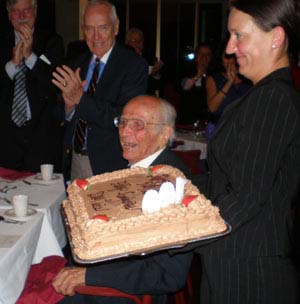 Luis
Leal, an internationally recognized scholar of Mexican, Chicano and
Latin American literature who was one of the founders of the field
of Chicano literary studies, has died. He was 102.
Luis
Leal, an internationally recognized scholar of Mexican, Chicano and
Latin American literature who was one of the founders of the field
of Chicano literary studies, has died. He was 102. 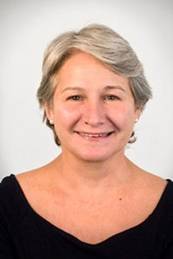
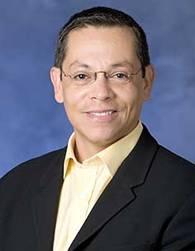
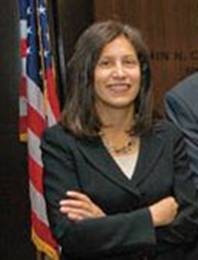
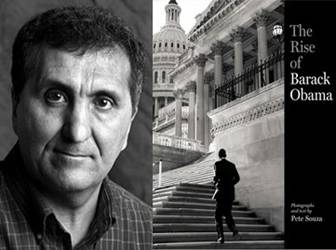
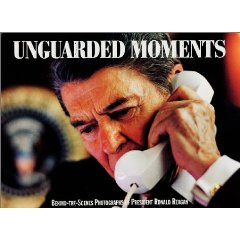
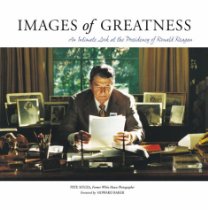
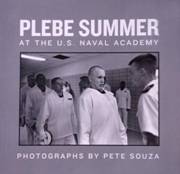

![[Debbie's photo by Sandy Gibbs (2/98)]](wiselatina.jpg)
 Sarmiento,
Juanita, beloved wife, cherished mother, mother- in-law, grandmother,
great grandmother, great great grandmother, aunt, and dear friend
passed away on 1/12/10, three months shy of her 90th birthday. Juanita
was born in Fort Worth Texas. Her mother, Marta Hernandez, passed away
when she was four, her father, Maximino Robles died when she was 12.
Separated from her two sisters, Gertrudis and Rosa, she was forced to
grow up quickly. And yet, the difficulties of her childhood developed
the strength and sense of humor that she would pass on to her family.
At 17, after the long separation, she reunited with her two sisters
and they resided together again as a family. They lived together until
they all married. At age 20, she met her soul mate Cruz. In June of
2009, they celebrated 66 years of marriage. In spite of her difficult
youth, she enjoyed life. She sang on the radio and continued to sing
all her life. She was not shy in stating her opinion or speaking in
public when asked. She was an active member in MAYAS which assisted
youth in continuing their education. She was also an avid seamstress.
We all remember her sharp sense of humor which will bring smiles to
our faces for many years. She leaves us a profound history of strength
and love gathered from the challenges of life. She was preceded in
death by her son, Cruz Sarmiento Jr. and her sister, Gertrudis Robles.
She is survived by her husband, Cruz Sarmiento and seven children,
Margaret Martinez, Yolanda Montoya, John Sarmiento, Robert Sarmiento,
Salvador Sarmiento, Cecilia Flores and Irene Sanchez; 28
grandchildren; 10 great grandchildren and 3 great-great-
grandchildren.
Sarmiento,
Juanita, beloved wife, cherished mother, mother- in-law, grandmother,
great grandmother, great great grandmother, aunt, and dear friend
passed away on 1/12/10, three months shy of her 90th birthday. Juanita
was born in Fort Worth Texas. Her mother, Marta Hernandez, passed away
when she was four, her father, Maximino Robles died when she was 12.
Separated from her two sisters, Gertrudis and Rosa, she was forced to
grow up quickly. And yet, the difficulties of her childhood developed
the strength and sense of humor that she would pass on to her family.
At 17, after the long separation, she reunited with her two sisters
and they resided together again as a family. They lived together until
they all married. At age 20, she met her soul mate Cruz. In June of
2009, they celebrated 66 years of marriage. In spite of her difficult
youth, she enjoyed life. She sang on the radio and continued to sing
all her life. She was not shy in stating her opinion or speaking in
public when asked. She was an active member in MAYAS which assisted
youth in continuing their education. She was also an avid seamstress.
We all remember her sharp sense of humor which will bring smiles to
our faces for many years. She leaves us a profound history of strength
and love gathered from the challenges of life. She was preceded in
death by her son, Cruz Sarmiento Jr. and her sister, Gertrudis Robles.
She is survived by her husband, Cruz Sarmiento and seven children,
Margaret Martinez, Yolanda Montoya, John Sarmiento, Robert Sarmiento,
Salvador Sarmiento, Cecilia Flores and Irene Sanchez; 28
grandchildren; 10 great grandchildren and 3 great-great-
grandchildren. 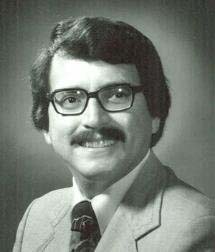

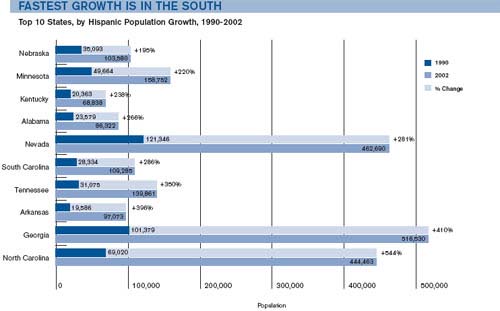
 The
most powerful Hispanic in Illinois is not a politician. It’s not a
baseball player. Not even a manufacturer. It is a distributor. One who
does not even care to tell anyone how much power he has accumulated nor
he cares about telling anyone that he is a Hispanic.
The
most powerful Hispanic in Illinois is not a politician. It’s not a
baseball player. Not even a manufacturer. It is a distributor. One who
does not even care to tell anyone how much power he has accumulated nor
he cares about telling anyone that he is a Hispanic. “I
know firsthand how important it is to understand personal finance. In
fact, if it weren’t for the Stock Market Game, I may not be where I am
today,” said Martin Cabrera, president of Cabrera Capital Markets
Inc., an investment-banking and institutional brokerage firm. “The
program teaches young people how to invest and use their analytical
skills. It made a huge difference in my life and I hope it can have the
same impact on these kids.
“I
know firsthand how important it is to understand personal finance. In
fact, if it weren’t for the Stock Market Game, I may not be where I am
today,” said Martin Cabrera, president of Cabrera Capital Markets
Inc., an investment-banking and institutional brokerage firm. “The
program teaches young people how to invest and use their analytical
skills. It made a huge difference in my life and I hope it can have the
same impact on these kids. Tony Jimenez, a veteran, knows the value of a military education. A former lieutenant colonel in the U.S. Army, Mr. Jimenez learned self-discipline, how to work smart, and how to motivate others. He also received a business education through the military and invaluable IT training.
Tony Jimenez, a veteran, knows the value of a military education. A former lieutenant colonel in the U.S. Army, Mr. Jimenez learned self-discipline, how to work smart, and how to motivate others. He also received a business education through the military and invaluable IT training.
 On
Saturday morning February 6th, business owner Joe Stocking is hosting
his laundromat grand re-opening located at 496 S. 25th Ave in Bellwood
Illinois. From 9:00 a.m. to 4:00 p.m., the laundromat will be giving
away free raffles, free food and refreshments and free prizes. In the
house from 2:00 p.m. to 4:00 p.m. will be your very own Latino author
Robert Renteria autographing copies of the Barrio books which have been
purchased and donated by Joe Stocking. Come and get your FREE copy of
the Barrio book and take a photo with Robert!
On
Saturday morning February 6th, business owner Joe Stocking is hosting
his laundromat grand re-opening located at 496 S. 25th Ave in Bellwood
Illinois. From 9:00 a.m. to 4:00 p.m., the laundromat will be giving
away free raffles, free food and refreshments and free prizes. In the
house from 2:00 p.m. to 4:00 p.m. will be your very own Latino author
Robert Renteria autographing copies of the Barrio books which have been
purchased and donated by Joe Stocking. Come and get your FREE copy of
the Barrio book and take a photo with Robert!
 Ruins
of a Society and the Honorable, is an autobiography and a story based on
real life circumstances as I lived it and remember it to the best of my
knowledge and recollection. Names have been changed to protect sources
from reprisals and legalities. Real names contained in this book were
either approved by the individuals personally; were part of a
publication made available to the public and encrypted in citations or
were spoken of by me in honorability; while others are based on personal
opinions. This book contains incidents which took place in one day and a
half while at a prison where I worked and outside the prisons
environment. It then sidetracks to speak of other stories, voice
opinions and reflects on my life as a young Latino growing up in
Brooklyn and abroad. This book honors many who crossed paths with me
during my lifetime, who inspired me and whose recognition is well
deserved. Honorableness can be described in many different definitions
and involve many different circumstances that led me to honor who I felt
deserves to be honored, and indeed an honor for me to do so. Although 75
percent of this book is based on prison experiences, other parts of this
book relates to the many life encounters we’ve all experienced in our
own lives. In reference to autobiographies and real life circumstances
concerning prison life, this will be Al Bermudez’s final book.
Throughout this book, the actual story stops with an asterisk, (*) to
voice an opinion or explain a different set of circumstances; then it
continues onto the actual story with the words, (STORY CONT).
Ruins
of a Society and the Honorable, is an autobiography and a story based on
real life circumstances as I lived it and remember it to the best of my
knowledge and recollection. Names have been changed to protect sources
from reprisals and legalities. Real names contained in this book were
either approved by the individuals personally; were part of a
publication made available to the public and encrypted in citations or
were spoken of by me in honorability; while others are based on personal
opinions. This book contains incidents which took place in one day and a
half while at a prison where I worked and outside the prisons
environment. It then sidetracks to speak of other stories, voice
opinions and reflects on my life as a young Latino growing up in
Brooklyn and abroad. This book honors many who crossed paths with me
during my lifetime, who inspired me and whose recognition is well
deserved. Honorableness can be described in many different definitions
and involve many different circumstances that led me to honor who I felt
deserves to be honored, and indeed an honor for me to do so. Although 75
percent of this book is based on prison experiences, other parts of this
book relates to the many life encounters we’ve all experienced in our
own lives. In reference to autobiographies and real life circumstances
concerning prison life, this will be Al Bermudez’s final book.
Throughout this book, the actual story stops with an asterisk, (*) to
voice an opinion or explain a different set of circumstances; then it
continues onto the actual story with the words, (STORY CONT).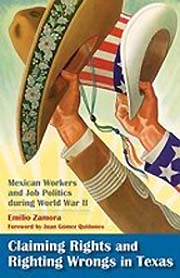

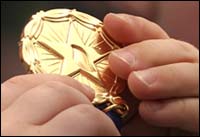 The Gold Medal of Remembrance is unique in that it is the only medal that recognizes and honors the children who have recently lost a parent in service to our country. It is a tangible reminder that casualties are found on the home front as well as on the battlefield. Designed by the Institute of Heraldry, which provides special services to the U.S. Armed Forces, federal agencies, and the Office of the President, this uniquely beautiful medal has become a truly special American tradition.
The Gold Medal of Remembrance is unique in that it is the only medal that recognizes and honors the children who have recently lost a parent in service to our country. It is a tangible reminder that casualties are found on the home front as well as on the battlefield. Designed by the Institute of Heraldry, which provides special services to the U.S. Armed Forces, federal agencies, and the Office of the President, this uniquely beautiful medal has become a truly special American tradition.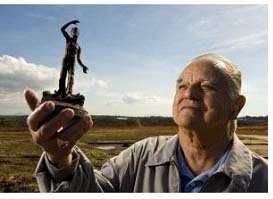 L
L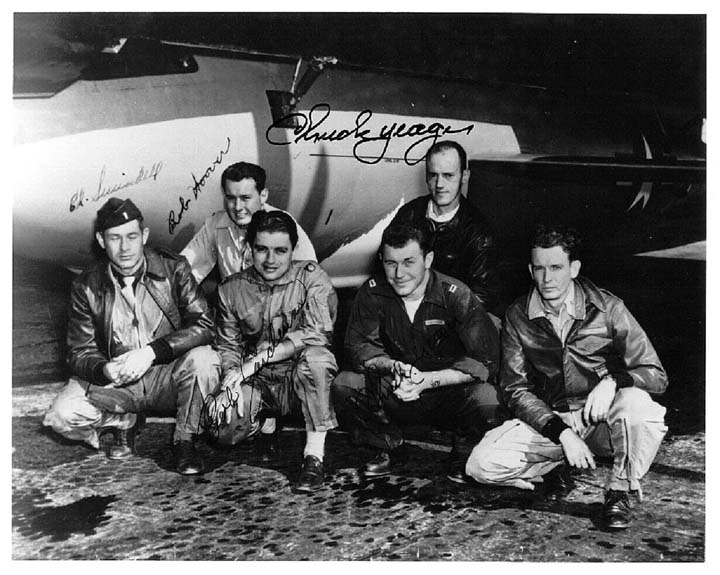

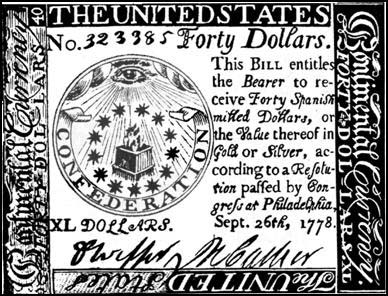
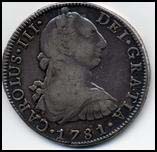
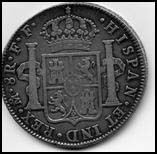
























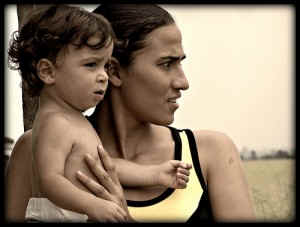
 Tom
DeWolf, one of the 10 family members who participated in the journey,
wrote a powerful account of his experiences with his cousins during
the making of the film. More information here.
Tom
DeWolf, one of the 10 family members who participated in the journey,
wrote a powerful account of his experiences with his cousins during
the making of the film. More information here.
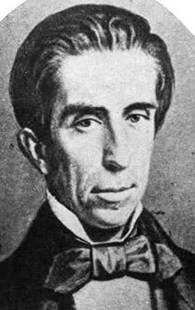
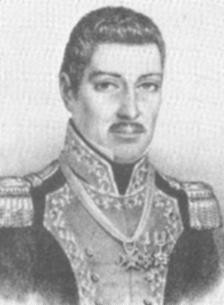
 Ruling
party candidate Laura Chinchilla has become Costa Rica's first woman
president with a landslide victory in Sunday's voting. Election
results showed Chinchilla with 47% of the votes cast, more than 20
percentage points ahead her closest rival. Her main opponents quickly
conceded defeat.
Ruling
party candidate Laura Chinchilla has become Costa Rica's first woman
president with a landslide victory in Sunday's voting. Election
results showed Chinchilla with 47% of the votes cast, more than 20
percentage points ahead her closest rival. Her main opponents quickly
conceded defeat.